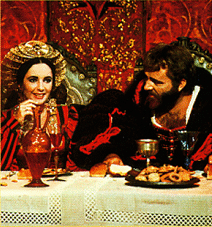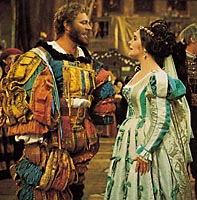Dr. Michael Delahoyde
Washington State University
THE TAMING OF THE
SHREW
ACT V
The ending of the play is easy to (mis)interpret in the most
superficial manner, which makes it easy for Elizabethan as well
as most modern lunkheads to go home after the play and live with
themselves. Even George Bernard Shaw, whose misanthropy I normally
cheer, claimed about the final scene that "No man with any decency
of feeling can sit it out in the company of a woman without being
extremely ashamed of the lord-of-creation moral implied in the wager
and the speech put into the woman's own mouth" (qtd. in Wells 52).
- But what has really happened? What is Kate really saying?
- What is Shakespeare's resolution to the traditional battle between
the sexes?
- What will the various marriages be like for each of the couples? Do
you agree with a recent critic who insists that Kate and Petruchio will
be the happiest married couple in Shakespeare?
Before Henry V and The Merchant of Venice, "it is The
Taming of the Shrew that is possibly the most striking example among
his early works of his love of so contriving a play that it should mean,
to those who might choose to take it so, the precise opposite of what he
knew it would mean to the multitude" (Goddard, I 68).
SCENE i
The various disguisings reach their chaotic climax, with Vincentio being
especially confused. Undisguisings follow and the Bianca/Lucentio plot is
resolved in a marriage match. A high point amid all this is Lucentio
declaring, "Love wrought these miracles" (V.i.124).
Kate and Petruchio look on this spectacle and Petruchio supplies another
test: "kiss me, Kate" (V.i.143) -- hence the atrocious musical which,
notwithstanding, does include the song "Brush Up Your Shakespeare." Kate
is reluctant, Petruchio threatens that they'll leave town, and Kate
explains that she's just embarrassed, being in the street. She acquiesces
and he says, "Is not this well?" (V.i.149). They seem to demonstrate true
affection towards each other here, and some critics try to say that Kate
will be the tamer vs. the tamed. The true situation will be kept under
cover: women can lord it over men so long as men think they're in charge.
Maybe this makes sense; after all, the doctrine of male superiority is
decidedly unshakespearean -- his heroines always seem stronger than their
male counterparts (Goddard, I 68).
SCENE ii
|
At a feast for Lucentio and Bianca (and Hortensio and the widow),
Petruchio is subtly critical of self-indulgent, complacent, Paduan life:
"Nothing but sit and sit, and eat and eat!" (V.ii.12; cf. 14). The
"widow" is snippy to Kate. Note that the widow has no name -- in fact,
she's still called "widow" even now! Why does this make perfect sense in
Paduan society?
A contest is generated regarding wifely obedience and the men place their
bets -- "a wager about wifely obedience entered upon by characters who
believe that the risks and dangers of courtship are past, so that they
may now take pleasure in their newly married condition, as masters (and
mistresses) of their own lives, no longer beholden to parents or other
authority figures" (Garber 65). Lucentio sends for Bianca, who refuses
to come.
It is not really surprising that sweet Bianca doesn't come. Why should
she? She has spent her whole life being sweet Bianca, and simpering
and exuding charm, for only one purpose -- to catch a man.... Well,
her catching days are over, at least for a while, and now she means
to relax. Wouldn't anyone after a lifetime of work? The same for the
widow, doubly, since she has had to work a second time to catch a second
husband. (Asimov 463)
|

|
Hortensio "entreats" his wife to come, but she also refuses. All present
are surprised that Katherine not only comes to Petruchio's summons, but
also drags the other two women in. Kate pontificates at some length on
the duties of the wife to her husband: "Thy husband is thy lord, thy
life, thy keeper" (V.ii.146). Everyone is astounded, including us in
the audience!
The standard interpretation is that maybe in this case, Shakespeare is
of his age instead of for all time (Wells 51), and discussions of the
play tend to try to apologize by insisting on its earliness in the
canon. But is Shakespeare himself buying into what he has Kate
saying here: "the wholly un-Shakespearean doctrine of male superiority,
a view which there is not the slightest evidence elsewhere Shakespeare
ever held" (Goddard, I 68)? [Shakespeare "clearly preferred his
women characters to his men" (Bloom 35). "Shakespeare's heroines are,
if anything, wiser, more capable, and better than his heroes" (Asimov
458).]
Note, for example, that in the end Kate is still bullying Bianca, but now
with social, male approval on her side. Meanwhile, Bianca belies the
truth in a late line to husband criticizing his bet: "The more fool you
for laying on my duty" (V.ii.129) -- uh oh, that sounds bad. Bianca is
not "white." Bianca is the real shrew.

|
Furthermore, Kate is neither broken nor cowering at the end, and
Petruchio is not coming off like a crude bullying caveman. Like
bearbaiting, this "taming" can be a brutal spectacle. But perhaps
"Kate's journey can be seen as a process that brings her to a
full realization of her potentialities as a woman rather than as
a process of brainwashing, crushing her into cowed submission"
(Wells 51). Consider not so much the words -- who cares what
Paduans want to hear by this point? -- but the dramatic effect
Kate is able to create now, "the confident control of language
that she demonstrates" (Wells 51). She's learned something about
her potentialities and the power of being, if not heard, at least
not immediately dismissed. The speech is concerned with defining
the proper relationship in marriage, as in Comedy of Errors,
and it all sounds dismally traditional, but really, Kate "is advising
women how to rule absolutely, while feigning obedience" (Bloom 33).
The speech is redundant and hyperbolically submissive. There's "a
secret language or code now fully shared by Kate and Petruchio"
(Bloom 35). The relationship has gone underground and we don't
know what really goes on between them now.
|
It concludes with harmonious synthesis, but it has celebrated defiance
and rebellion. Perhaps what Petruchio does to Kate, Shakespeare does
to his audience (?). "Their final shared reality is a kind of conspiracy
against the rest of us" (Bloom 29).
LOST ENDING?
This play omits the return of the frame. The other version of the play
ends with Christopher Sly going off to apply the lessons learned to his
own shrew of a wife: "I know now how to tame a shrew, / I dreamt vpon it
all this night till now, / And thou hast wakt me out of the best dreame /
That euer I had in my life, but Ile to my / Wife presently and tame her
too / And if she anger me" (Q).
It might have worked: Petruchio may be persuaded that he is lord finally,
as Sly was falsely persuaded. Both are a bit intoxicated with something
(the old Shakespearean blur of lovers, lunatics, and drunkards).
Is it that a page was missing when the materials were collected for the
First Folio? That Shakespeare "grew impatient with the outer frame as merely
serving to get in his way and he dropped it" (Asimov 451)?
Is it that Sly's "disenchantment necessarily would be cruel"
(Bloom 28), or just too anticlimactic "and would disturb the mutual triumph
of Kate and Petruchio, who rather clearly are going to be the happiest married
couple in Shakespeare" (Bloom 28)? So perhaps Shakespeare cancelled it and
may have meant to cancel the opening Induction too? Or is it that finally
there is no Sly at the end because "It would be altogether too much like
explaining the joke" (Goddard, I 73)? (Remember: the huntsman's lines about
dogs in the Induction may have been a clue -- the best dog picks out the
dullest scent.)
Shakespeare Index

